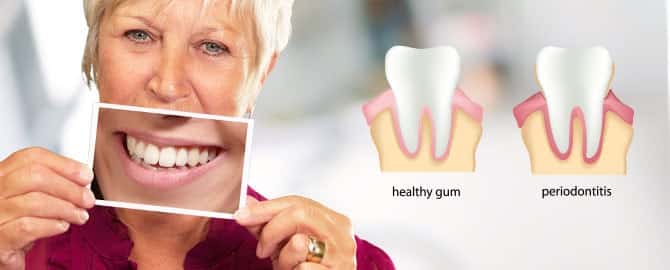Periodontal Maintenance is very important for those effected by serious gum infections.
The gums form the support structure for your teeth. Periodontal diseases, or infections of the gums, gradually destroy the gums and thus, the support of your natural teeth. There are a multitude of diseases that can cause this, many of which require their own unique solutions. Adults over the age of 35, lose more teeth to gum disease than from cavities and 75 percent of adults have some degree of gum disease in their lifetime. Let’s dive deeper into Periodontal Maintenance.
Some factors that can affect the health of your gums include:
- Smoking
- Diabetes
- Stress
- Clenching and grinding teeth
- Medication
- Poor nutrition
Bacterial plaque is the biggest cause of gum disease and daily oral hygiene – typified by regular tooth brushing and flossing – helps manage plaque and prevent most periodontal conditions.
Plaque is a colorless film that constantly forms and accumulates on your teeth and usually sticks to teeth at the gum line. Bacteria found in plaque produce toxins that irritate gums, often causing them to swell, turn red and bleed with ease. If prolonged, this can cause the gums to separate from the teeth, resulting in pockets forming.
As the disease progresses, the supporting gum tissue and bone holding teeth in place deteriorates. Ultimately, if left untreated, this leads to tooth loss.
Bleeding gums are a major warning to the possibility of tooth loss, and we need to address that right away. Affiliated Dentists treats gum disease with a multi-faceted approach that includes deep scaling, mouth rinses and periodontal maintenance.
Scaling & Root Planing is part of Periodontal Maintenance.
Most patients with periodontal disease will require a special “deeper” cleaning called scaling and root planing. Scaling and root planing removes plaque and tartar from below the gum line. This controls the growth of destructive bacteria. It also helps the gums to reattach to the root of the tooth. Because the procedure is performed beneath the gum line, your gums will be numbed for your comfort. Two to four visits may be necessary to the complete the treatment. You can expect some minor soreness after the treatment.
Scaling and Root Planing: After Care Instructions
Following Scaling and Root Planing, you can expect to notice less redness, and less bleeding, and less swelling of your gum tissue. Your gum health can be maintained with proper home care and regular professional care.
Discomfort/Pain
Discomfort or pain should subside in a few days. Discomfort immediately after treatment is usually associated with slight throbbing or aching and occasionally may be uncomfortable. This discomfort usually subsides in about four hours. Any discomfort due to brushing should get better in one to three days.
Tooth Sensitivity
Teeth may be sensitive to temperature changes and/or sweets. The sensitivity to temperature may be intense the first two or three days.
Bleeding
Some slight bleeding may occur during the next several brushings but the bleeding should steadily decrease after two or three days.
Appearance
Root surfaces may be more exposed as the inflammation subsides. This may result in more spaces between teeth.
Instructions to Minimize Symptoms
Diet/Eating—If extensive root planing was performed, chewing hard foods, such as meat or raw vegetables may be uncomfortable; this should last no longer than a few days. A diet of softer consistency would be advised until chewing becomes more comfortable.
Discomfort/Pain/Sensitivity
If a local anesthetic was used, avoid chewing foods until feeling returns to avoid injury to the tongue or cheeks. Acetaminophen or a non-aspirin analgesic should be taken as needed to reduce discomfort. If tooth sensitivity persists, use a desensitizing dentifrice (toothpaste) containing potassium nitrite. If the sensitivity is severe and prolonged, professional application of a desensitizing agent may be required.
Oral Hygiene
If gum tissues are tender, brush your teeth gently but thoroughly; this may take a little more time than normal. By the third to fourth day, normal oral hygiene techniques can be resumes. Mouth rinsing is recommended with either of the following solutions: (1) an antimicrobial rinse, or (2) a warm saline rinse. Use of these rinsed should be limited to one to two weeks.
Should you be experiencing any issues, please contact our offices immediately to get in touch with our staff.
